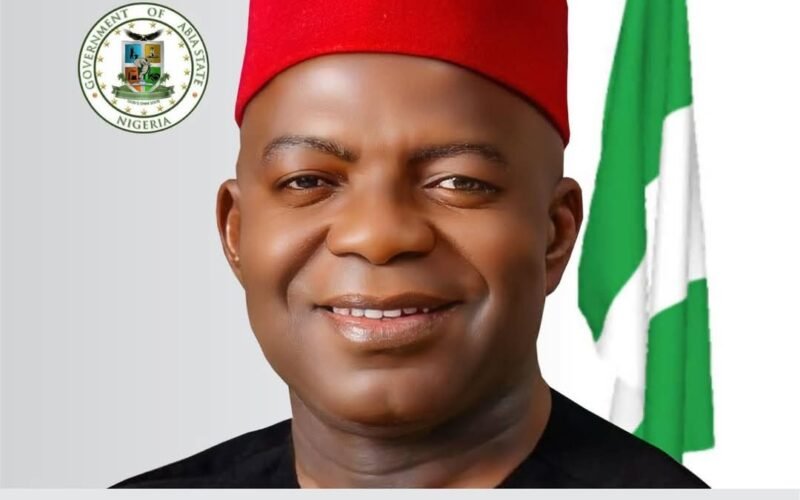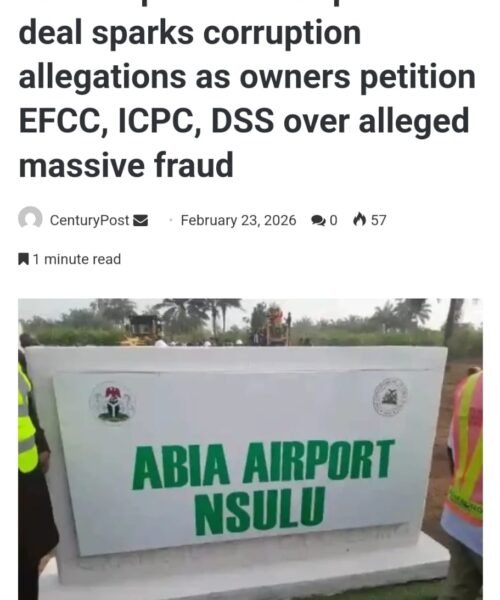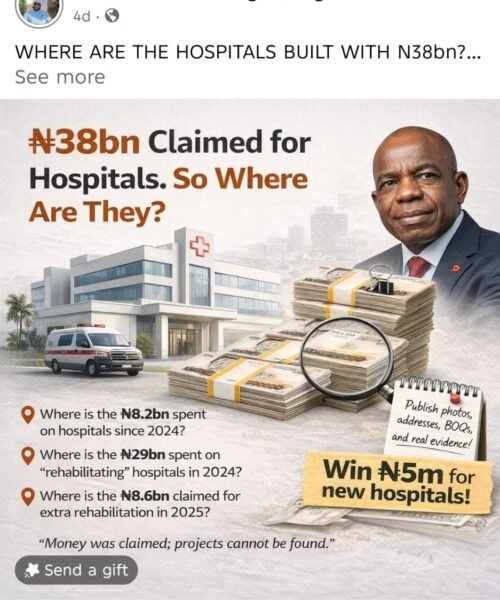Setting the Record Straight: Governor Otti’s Administration is on the Right Track
Recent misinformed articles have attempted to tarnish the reputation of Governor Alex Otti’s administration in Abia State. As a concerned citizen, I feel compelled to set the record straight and provide a more accurate representation of the governor’s accomplishments.
First, let’s look into the World Bank. Let’s be guided when using neo-colonialist paradigms to disparage your governments. These Bretonwood Institutions have their agendas. Their history is ladden with missteps, extortion, errors and outright lies against Africa! Indeed Abia.
Remember my article on the tale of two statistics?
Here are some refresher courses on the self acclaimed omniscient World Bank. The World Bank’s involvement in Africa has been a subject of controversy, with critics arguing that the institution’s policies have exacerbated poverty, inequality, and environmental degradation on the continent. One of the key criticisms is that the World Bank’s structural adjustment programs (SAPs) have led to a decline in social spending, including healthcare and education. According to a study by the African Development Bank, the implementation of SAPs in the 1980s and 1990s led to a reduction in social spending from 34% of total government expenditure in 1980 to 22% in 1995.
Furthermore, the World Bank’s emphasis on economic growth has not translated into poverty reduction. Despite the continent’s impressive economic growth rates, poverty remains widespread. According to the World Bank’s own estimates, the number of people living in extreme poverty in Africa increased from 280 million in 1990 to 330 million in 2015. This represents a poverty rate of 43%, which is significantly higher than the global average. The World Bank’s policies have also been criticized for exacerbating income inequality. According to a report by Oxfam, the richest 10% of Africans own 55% of the continent’s wealth, while the poorest 50% own just 3%.
The World Bank’s infrastructure development projects have also been criticized for their environmental and social impact. According to a report by the International Rivers Network, the World Bank’s funding of large dams in Africa has led to the displacement of over 1 million people and the destruction of critical ecosystems. The report also notes that the World Bank’s funding of fossil fuel projects in Africa has contributed to climate change, which is having devastating impacts on the continent. In addition, the World Bank’s infrastructure development projects have been criticized for their lack of transparency and accountability. According to a report by the African Forum and Network on Debt and Development, the World Bank’s funding of infrastructure projects in Africa is often shrouded in secrecy, making it difficult for citizens to hold their governments accountable.
The World Bank’s policies on healthcare and education have also been criticized for their impact on the poor. According to a report by the Global Campaign for Education, the World Bank’s promotion of user fees for healthcare and education has led to a decline in access to these essential services for the poor. The report notes that user fees have a disproportionate impact on the poor, who are often forced to choose between paying for healthcare or education and other essential expenses. In addition, the World Bank’s policies on healthcare and education have been criticized for their lack of focus on equity and quality. According to a report by the African Network Campaign on Education for All, the World Bank’s funding of education projects in Africa has often prioritized quantity over quality, leading to a lack of emphasis on equity and inclusivity.
The World Bank’s policies on land and agriculture have also been criticized for their impact on small-scale farmers and local communities. According to a report by the Oakland Institute, the World Bank’s funding of large-scale agricultural projects in Africa has led to the displacement of small-scale farmers and the destruction of critical ecosystems. The report notes that the World Bank’s policies on land and agriculture have prioritized the interests of large-scale corporations over those of small-scale farmers and local communities. In addition, the World Bank’s policies on land and agriculture have been criticized for their lack of focus on sustainability and climate change. According to a report by the African Centre for Biosafety, the World Bank’s funding of genetically modified crops in Africa has contributed to the degradation of the continent’s biodiversity and the exacerbation of climate change.
In conclusion, the World Bank’s involvement in Africa has been criticized for its impact on poverty, inequality, and environmental degradation. The institution’s policies have prioritized economic growth over social development, leading to a decline in social spending and an increase in poverty and inequality. The World Bank’s infrastructure development projects have also been criticized for their environmental and social impact, while its policies on healthcare and education have been criticized for their lack of focus on equity and quality. Ultimately, the World Bank must rethink its approach to development in Africa, prioritizing policies that promote inclusive growth, poverty reduction, and sustainable development. So don’t use World Bank as a standard to judge a man and government simply struggling to avert monumental drawback.
*Look, my very esteemed brother Chief Oriaku, no government on this planet earth is perfect nor has solved all problems of it’s citizen. It’s a huge struggle if you inherit a rotten system. Here are eight robust paragraphs loaded with statistics, highlighting that no government on earth is immune from problems, misconceptions, and misrule:
European and American Continent Examples
In the United Kingdom, for instance, the government has faced criticism for its handling of the COVID-19 pandemic. According to a report by the National Audit Office, the UK government spent £12.1 billion on personal protective equipment (PPE) during the pandemic, but a significant portion of this equipment was deemed unfit for use (National Audit Office, 2020). This example illustrates that even in developed democracies, governments can make mistakes and face scrutiny.
In the United States, the government has faced criticism for its handling of the opioid crisis. According to the Centers for Disease Control and Prevention (CDC), more than 500,000 people have died from opioid overdoses in the US since 1999 (CDC, 2020). The government has been accused of being slow to respond to the crisis, and of prioritizing the interests of pharmaceutical companies over those of patients.
In Canada, the government has faced criticism for its handling of indigenous affairs. According to a report by the Truth and Reconciliation Commission, the Canadian government has failed to address the legacy of residential schools and other forms of systemic racism (Truth and Reconciliation Commission, 2015). This example illustrates that even in countries with a reputation for progressive governance, there can be significant problems and misconceptions.
In Australia, the government has faced criticism for its handling of climate change. According to a report by the Climate Council, the Australian government has failed to take adequate action to reduce greenhouse gas emissions and transition to renewable energy (Climate Council, 2020). This example illustrates that even in countries with a strong economy and high standard of living, governments can face significant challenges and criticisms.
Non-European and Non-American Continent Examples
In South Africa, the government has faced criticism for its handling of corruption. According to a report by the Corruption Watch, the South African government has failed to address the widespread corruption that has plagued the country since the end of apartheid (Corruption Watch, 2020). This example illustrates that even in countries with a strong democratic tradition, governments can face significant challenges and criticisms.
In India, the government has faced criticism for its handling of poverty and inequality. According to a report by the World Bank, India has made significant progress in reducing poverty in recent years, but there is still much work to be done (World Bank, 2020). This example illustrates that even in countries with rapid economic growth, governments can face significant challenges and criticisms.
In Brazil, the government has faced criticism for its handling of deforestation and environmental protection. According to a report by the Amazon Conservation Association, the Brazilian government has failed to take adequate action to protect the Amazon rainforest and prevent deforestation (Amazon Conservation Association, 2020). This example illustrates that even in countries with a rich natural environment, governments can face significant challenges and criticisms.
In Indonesia, the government has faced criticism for its handling of human rights. According to a report by Human Rights Watch, the Indonesian government has failed to address the widespread human rights abuses that have occurred in the country, particularly in the provinces of Papua and West Papua (Human Rights Watch, 2020). This example illustrates that even in countries with a strong economic growth, governments can face significant challenges and criticisms.
Chief Oriaku, it’s clear that you have a significant influence, and rather than using it to tear others down, it would be more beneficial to focus on rebuilding and strengthening the image of the PDP in Abia state and nationally. This would be a valuable use of your time and energy, and would likely have a positive impact on the party and its members.
By concentrating on rehabilitation and growth, you can help to create a more positive and supportive environment, both within the party and in the wider community. This approach would also demonstrate your commitment to constructive and respectful dialogue, rather than resorting to criticism or personal attacks. As the saying goes, “Strong people lift others up, while weak people put others down”. By choosing to focus on building up, you can make a real difference and earn the respect of others.
It’s quite amusing to see critics making noise about the ₦6.7 billion spent on a recreational facility, demanding to know its location. Let’s turn the tables and remind them that similar projects have been successfully executed in other countries. For instance, the New Holmenkollen Ski Jump in Oslo, Norway, is a remarkable example of innovative design and engineering. This project not only provides a world-class skiing facility but also serves as a tourist attraction, generating revenue for the local economy.
In Denmark, the Gammel Hellerup Gymnasium Multi-Purpose Hall is another exemplary project that showcases the importance of investing in recreational facilities. This design serves as both a sports hall and a social area, providing a unique space for students and the community to engage in various activities. These examples demonstrate that investing in recreational facilities can have a positive impact on the economy, social cohesion, and overall quality of life.
Before a recreational facility is physically constructed, it undergoes various phases, including concept design, project design, and discussion. This process can take up to a year or two and consumes significant capital. Therefore, it’s essential to be patient and trust the governance process. The Abia state government is committed to deploying a world-class recreational facility, and this requires substantial investment at the design stage.
In due time, the details surrounding the recreational facility will be made public. For now, it’s crucial to remember that a state that does not invest in its recreational facilities is a state that does not invest in its future. Abia state is committed to providing its citizens with top-notch amenities, and this investment is a testament to that commitment. Let’s embrace the positive impact that these facilities can bring to our communities and economy.
It’s amusing to see Chief Oriaku questioning the allocation of ₦7 billion to research and development (R&D) in Abia State. This amount is grossly inadequate for a state with a population of over 4 million people . To put this into perspective, ₦7 billion translates to a meager ₦1,750 per capita. This is a laughable investment in R&D, especially when compared to global standards.
In reality, ₦7 billion is just a drop in the ocean. Abia State needs a much more substantial investment in R&D to drive innovation, economic growth, and development. A more realistic target would be ₦128 billion, which would translate to around ₦32,000 per capita. This would be a significant investment in the state’s future, and Chief Oriako’s ignorance of this fact is quite astonishing.
Research and development (R&D) are indeed intangible investments that drive long-term growth and development. It’s puzzling that anyone would question the allocation of ₦7 billion to R&D, considering its potential impact on Abia State’s economy. To put this into perspective, ₦7 billion is approximately $17.5 million USD. According to the UNESCO Institute for Statistics, the global average expenditure on R&D is around 2.2% of GDP. For Abia State, with a population of over 4 million, ₦7 billion translates to roughly ₦1,750 per capita.
In comparison, countries like the United States invest heavily in R&D, with expenditures totaling around 2.7% of GDP. According to the National Science Foundation, the US invested approximately $553 billion in R&D in 2020, which translates to around $1,693 per capita. Considering Abia State’s population and economic growth potential, investing ₦128 billion in R&D, as suggested, would be a more substantial commitment to driving innovation and development. This would translate to around ₦32,000 per capita, a more significant investment in the state’s future.
Transparency and Accountability
The Abia State Accountant General’s Report for 2022, which is publicly available, demonstrates Governor Otti’s commitment to transparency and accountability. The report provides a detailed breakdown of the state’s financial dealings, ensuring that citizens are informed and engaged in the governance process.
SFTAS Program: A Testament to Transparency
The SFTAS program, which mandates the publication of quarterly and annual financial reports, is a testament to Governor Otti’s dedication to transparency. This program has enhanced the state’s fiscal discipline, ensuring that resources are allocated efficiently and effectively.

Conclusion
Governor Otti’s administration is making significant strides in transforming Abia State. The investments in recreational facilities, research and development, and transparency initiatives demonstrate a clear vision for the state’s future.
It’s time to put the facts straight and recognize the progress being made in Abia State. Governor Otti’s administration is on the right track, and with continued support, Abia State will reach its full potential.
Dr Chukwuemeka Ifegwu Eke writes from the University of Abuja Nigeria.







